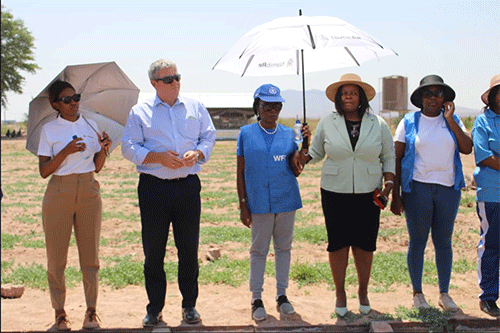BERSEBA - The project manager of the Berseba Integrated Community Food Project said with the needed support, the project can become the village’s next food basket.
Raymond Jossop was enthusiastic during a recent site visit from the main sponsors, being the British High Commission to Namibia and the Namibian National Reinsurance Corporation (Namre).
Jossop and seven volunteer community members are in the lay hen industry, producing eggs as well as growing spinach, beetroot, tomatoes and onions.
In a speech read on her behalf at the event, //Kharas regional governor Aletha Frederick said the stakeholders’ commitment to improving food security and promoting sustainable agricultural practices in the region is truly commendable, and that the region is indeed honoured to be partnering with such renowned organisations. “As we gather here today, I’d like to remind us of the valuable lessons we’ve learned over the last few years,” she noted. Frederick said the global economic crisis and lengthy droughts, followed by the Covid-19 epidemic, taught residents the necessity of food self-sufficiency and the need to focus on producing their own food, especially when Namibia’s borders were closed to curb the spread of the disease. “These challenges have highlighted the urgent need for sustainable and resilient food systems that can withstand shocks and stresses,” she emphasised.
Frederick continued: “We believe that the success and sustainability of the agricultural sector greatly depends on implementing capacity-building programmes to equip individuals with the necessary skills and knowledge to engage in modern farming practices, agribusiness management, and value chain development.”
She also slammed the perception that agriculture is a life of struggle and hardship as a common stereotype which has been perpetuated over time. ‘’However, it is important to recognise that this perception is a myth, and does not accurately reflect the potential of the agricultural industry,” she added. She said by embracing innovation, modern technology and implementing investments and incentives, agriculture has the potential to transform rural economies and create many job opportunities for young people and women.
“We look forward to sharing updates on the progress and challenges of the project,” the governor added.
In his remarks, Jossop said with an average 500 lay hens, they are able to get at least 360 eggs per day. “We are selling 600 of them weekly to the Central Lodge accommodation facility in Keetmanshoop, whilst we are also providing local vendors on a daily basis with eggs to sell for a profit. But the demand is turned out to be very high that we at times do not have the needed supply,’’ the manager noted.
Jossop said they have planted seedlings in beds, and will then transfer them to the shaded greenhouse nets later. “Our projection is to harvest at least by the first week of December, whereby we will sell some of the vegetables to vendors and the local community at affordable prices,” he continued. The project head said the volunteers employed will be compensated from the surplus production, or money derived from sales.
The food project is facilitated by the World Food Programme (WFP), which sourced funds from the British High Commission to Namibia and Namre. Technical experts from the WFP will additionally provide training to the volunteers on the best use of drip irrigation from underground water pumped with solar systems.
- sklukowski@nepc.com.na


